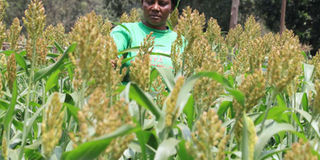Sorghum boosts incomes, illicit liquor war

A farm worker tends to a sorghum demonstration plot at Kabiruini ASK grounds in Nyeri on August 29, 2017. PHOTO | JOSEPH KANYI | NATION MEDIA GROUP
What you need to know:
For months on end, a farmer in Nyanza or eastern Kenya toils and dedicates their time to producing the best quality of sorghum, a critical raw material in beer production.
Today, 80 per cent of raw material used at Kenya Breweries Limited is locally sourced—a milestone achieved through strategic partnerships in the value chain.
A few years back, illicit liquor was one of the major challenges facing the country with thousands of youth opting for drinks such as chang’aa, which were cheap but often posed serious dangers to their health.
Agriculture is a major source of employment in Kenya and the largest contributor to the gross domestic product, accounting for 35.6 per cent of GDP in 2016, according to data by the World Bank.
Most importantly, it is the source of livelihood for most of the rural population and the key to food security and reduction of poverty.
Farmers are not only playing a crucial role in building the economy but are also key in the fight against illicit brewing by providing raw materials for products popular in Kenya and elsewhere.
For months on end, a farmer in Nyanza or eastern Kenya toils and dedicates their time to producing the best quality of sorghum, a critical raw material in beer production.
Today, 80 per cent of raw material used at Kenya Breweries Limited (KBL) is locally sourced—a milestone achieved through strategic partnerships in the value chain.
CREATED EMPLOYMENT
This has created employment for more than 30,000 farmers and continuously generates business value by supporting over 80,000 businesses.
A few years back, illicit liquor was one of the major challenges facing the country with thousands of youth opting for drinks such as chang’aa, which were cheap but often posed serious dangers to their health.
The drinks, contaminated with methanol and other concoctions, eventually caused blindness and resulted in death.
This led to the introduction of Senator Keg in the Kenyan market, which is now providing a safe, affordable beer that is at the centre of the fight against illegal brews. The ongoing formalisation to enable licensing of outlets that previously sold illegal alcohol, making them exclusive Senator Keg outlets, will also ensure that consumers get high-quality beer in hygienic conditions and at affordable prices.
Alcohol manufacturers have a responsibility to create a responsible drinking culture.
ALCOHOL
The abuse of alcohol can cause serious problems for individuals, communities and the society and one way of combating this is by providing consumers with the information and tools that they need to make informed choices about alcohol consumption.
In support of World Health Organisation’s (WHO) target of reducing alcohol-related harm by 10 per cent come 2025, KBL has made great strides in launching initiatives that promote responsible drinking.
Among them is the “Under 18 Asipewe” campaign that has engaged more than 20,000 retailers, helping them to understand why it is wrong to sell alcohol to underage persons.
Collaboration with industry partners is a key component of these efforts, involving partnerships with the government, NGOs and the society to raise awareness and change behaviour.
KBL’s aim is to recruit at least one million responsible drinking ambassadors by 2020 as well as increase underage education initiatives by half by 2020.
CHANGING COMMUNITY
Farmers, who are changing the community for the better, deserve to have a comfortable and decent life. Through the keg, KBL supports this concept by providing a market for drought-resistant crops such as sorghum, which is diversifying the country’s crop base and improving overall food security.
Economic empowerment is key in maintaining the mutually beneficial partnership, which has seen KBL pay more than Sh2 billion annually to local barley and sorghum famers.
Our engagement with these small-scale farmers also focuses on the “Jilishe Kisha Uuze” programme that encourages them to grow sorghum and millet to meet their household needs then sell the surplus to increase their income.
Enhanced value partnerships with farmers to provide quality sorghum will ensure the production of Senator Keg continues and that consumers have a healthy and affordable option, pulling them away from the jaws of illicit brews.
Eric Kiniti is the corporate relations director at EABL. [email protected]





